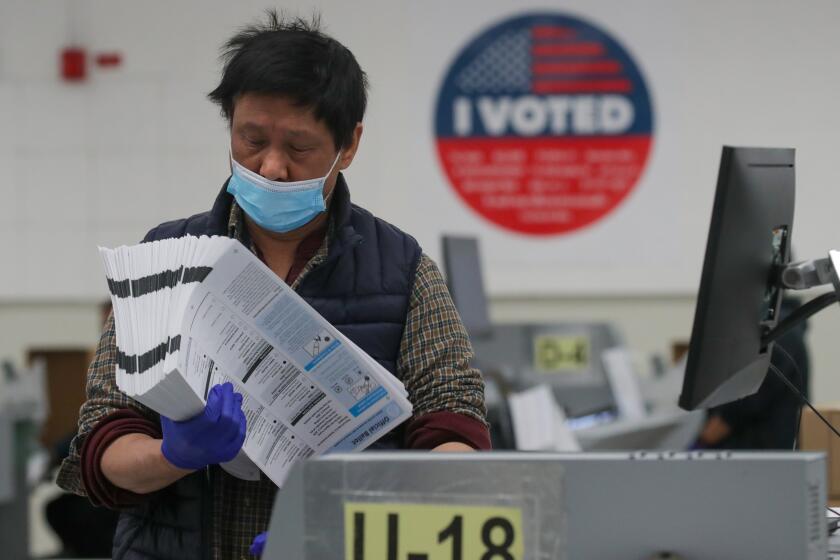GOP Rep. Michelle Steel wins reelection after campaign marked by charges of red-baiting, racism

GOP Rep. Michelle Steel held on to her congressional seat after a campaign that included claims of red-baiting, misogyny and racism in a congressional district created to empower Asian American voters.
In an Orange County district centered on the community of Little Saigon, Steel bested Jay Chen, a Democratic Navy reserve officer, in one of the most divisive races in California this year. The Associated Press called the race Monday, though official results will take longer.
“I am humbled that voters have given me the opportunity to continue to fight for them in Washington, D.C.,” Steel said in a statement that twice mentioned “communist China,” a constant thread in her campaign.
Chen conceded the race but criticized Steel’s campaign tactics. She used inflammatory mailers and videos to try to paint Chen as a communist sympathizer because of a school board vote he made more than a decade ago in support of a Chinese cultural and language program.
“While Michelle Steel won this election, the attacks on my patriotism because of my Asian heritage were unbecoming of a United States representative. I ran my campaign on the issues of lowering costs for working families, protecting a woman’s right to choose, and passing common sense legislation to end the scourge of gun violence,” Chen said in a statement. “My opponent refused to debate me, refused to hold town halls, refused on-camera interviews with news media, and ran a campaign of fear and division to hide her voting record.”
Steel, who is Korean American, and Chen, who is Taiwanese American, competed to represent California’s new 45th District, which straddles Los Angeles and Orange counties. Orange County includes the largest number of people of Vietnamese descent outside Vietnam. Many fled authoritarianism or are descended from people who did, and remain distrustful of communist governments.
The inland district includes Artesia, Cerritos and Westminster, with Asian Americans representing 37% of the district’s potential voters. White residents make up 36% of citizens of voting age, Latinos, 23%, and Black residents, 3%. Democrats have a 5.7% edge over Republicans among registered voters.
Steel opted to run here after her Seal Beach home was placed into the same district as Democratic Rep. Katie Porter, a prolific fundraiser, in the redrawing of congressional maps after the U.S. census. (Members of Congress don’t have to live in their districts.)
In the midterm election, California swayed control of Congress and the last races added to Republicans’ margin of power. Here’s where House races stand.
Steel is a familiar face in state GOP politics. She served on the state Board of Equalization for eight years, on the Orange County Board of Supervisors for six years, and in Congress since 2021. She was one of the first three Korean American women elected to the House. She was born in Seoul and raised in South Korea, Japan and the United States,
Chen, the son of immigrants, is an intelligence officer who served on the Korean Peninsula and in the Middle East. He is a member of the Board of Trustees for Mt. San Antonio Community College. He previously served on the Hacienda La Puente Unified School District Board of Education for eight years, worked as a management consultant and owns a real estate business.
California GOP Rep. Michelle Steel faces backlash from Asian American groups over ads depicting Democrat and Navy reservist Jay Chen as a communist sympathizer.
Steel’s campaign sent out fliers featuring a heavily doctored image purporting to show Chen holding “The Communist Manifesto” while teaching children in a classroom decorated with communist icons. A Steel ad featured actors portraying Chinese Communist Party officers calling Chen “one of us, a socialist comrade.” Red and yellow signs placed in the district labeled the Democrat “China’s choice.”
Veterans denounced the attack as a dishonest slur against a military officer. And Asian American groups accused Steel of dividing the community and of perpetuating stereotypes at a time when hate crimes against the community have spiked.
The campaign had heated up well before the primary, with Steel accusing Chen of misogyny for saying she relied on talking points from her husband, a prominent state Republican Party official. She also said he mocked her accent when he said he needed “an interpreter to figure out exactly what she’s saying.” Chen said he was referring to a written transcript of her remarks, which he described as “convoluted talking points.”
More to Read
Get the L.A. Times Politics newsletter
Deeply reported insights into legislation, politics and policy from Sacramento, Washington and beyond. In your inbox three times per week.
You may occasionally receive promotional content from the Los Angeles Times.














